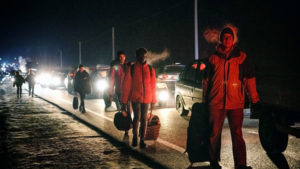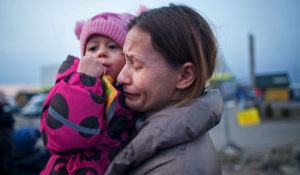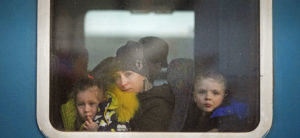From Munich station’s 35 platforms you can go anywhere in the world and I knew I would find them there. I had not expected their animals. When the bombs you never believed you would hear start falling, what do you grab, of all the things you own? The cats and the dogs, of course. A great pet migration is underway. There were cats in boxes and cat carriers and hold-alls. As I interviewed their owners, dogs under the tables nudged my feet and sniffed my legs.
It is true that at British airports signs, in English and Ukrainian, offer information. But Britain barely figures on the refugee trail. We send weapons to Ukraine, and donors give money, but as yet, for shameful political reasons, the British people have been mostly unable to help the people of Ukraine. Germany, a state shaped by Angela Merkel, one of the few leaders of her generation who was both capable and decent, has helped hundreds of thousands. And there they were, women and children and old men and pets, in an old dim waiting room in Munich, where a Catholic charity was giving out food and coffee and tea.
Cristina comes from paradise: Odessa was paradise, she said. Truly, paradise. She worked in cosmetics and says her life was “perfect” before the war. “When the bombs started I called my friend and I said, ‘Am I crazy? I know I don’t follow the news but have we got Nazis? Where are the Nazis?’ And he said, ‘No, it’s the Russians, it’s Russian propaganda.’”
Cristina speaks six languages. A few weeks ago, when she first arrived in Munich — via Romania, Hungary and Austria — she translated between other refugees and the German authorities for 48 hours non-stop. She helped about 800 people, awed German officials told her afterwards. With her pencilled-on eyebrows, piercings and air of mighty charisma, Cristina struck me as a kind of punk angel. She is most proud of engineering a family’s escape from Mariupol as it was encircled and devastated by the Russian army.
She is a fair distance from paradise now, sitting in the spring sun on the steps outside the old waiting room, but at least she is safe. “The Germans are strict but they are really good,” Cristian says, chain smoking. “If you can complete six stages, all the forms, you can get a house or a room or somewhere to live.”
Having settled her own family, found herself a room and completed a self-assigned mission to get a Ukrainian child with cancer in his chest, whom she met in Romania, to a specialist German hospital, Cristina returned to the station to help more refugees. The only time she came close to crying was when she described the welcome refugees receive in Romania:
“They just gave us everything. For the children they had made this room, this massive room, full of every sweet and cake and chocolate you can imagine. It was like a dream or something! And they got all the children together and they gathered them outside the doors and they just opened them and said there you are — it’s all for you. Romanians are incredible.”
The Austrian ticket inspector who combed refugee trains stuffed with fleeing women and children — all of whom had been issued special tickets by the authorities — extorting €160 per person in cash, on pain of ejection at the next station, is incredible in another way.
The worldwide refugee population was around 82 million, according to the UNHCR, before this war drove another 10 million from their homes. The average time it takes a refugee displaced by war to return to their country of origin varies by conflict and era — in cases of protracted catastrophe, it can be 21 years. Many will never return. A young woman I interviewed in Munich, a sales manager with a cat and a dog, who had left with six members of her family, said she would never go back to Ukraine. Her husband was fighting the Russians. She hopes he will live to join her in Germany.
And then there are the children. It is not the babies, toddlers or the little ones you worry about. Their needs are basic and immediate and they travel well, on the whole. It is the plight of the slightly older children, eight or nine and upwards, which gets you.
There was a girl at passport control in Ukraine who was about ten years old. She was wearing a smart jacket and ear warmers. She was in charge of an adult’s suitcase, the wheeled kind you pack for a week away, and also a carrier bag. With her, waiting in the line for people emigrating on foot, were her mother and grandmother.
In a booth, two young female soldiers were handling two lines at once — people coming out of Ukraine, and people going back in. Most of the soldiers at that border near Siret were women, and they looked shattered. There was an uncertain atmosphere all around the border. The sky looked grey and bitter and all I could see of Ukraine was a low ridge, tall trees and rooks.
That girl was being so good. She must have been good for weeks, I thought, ever since the war began. It’s not right, is it, for a ten-year-old to feel she has to behave so well for weeks and months?
In a sports hall a few miles from the border, back in Romania, I interviewed a group of children who are all national and international standard swimmers. They and every refugee I spoke to began their stories in the same way.
“At five in the morning the bombs started.”
Until that point, no one I interviewed had believed the Russians were really going to attack.
Most of the swimmers came from Kyiv and the surrounding region. Their coach had called all their families, a few weeks into the war, and offered to take the children to Romania, where they would be safe, and where they could swim.
They had been assembled in the sports hall to receive backpacks put together by volunteers from the Packed with Hope Campaign. The backpacks contained books in Ukrainian and English, head torches, water bottles and other useful things. There was an extraordinary stillness about the children. In the huge hall they chose to sit grouped tightly together. They regarded Gracie, and her Romanian co-organiser Gabriela Popescu, in a searching, almost unblinking way. They did not fidget or whisper, as any group of British 12 to 16-year-olds would.
When we spoke, they looked at me with a sort of steadiness: it was as though you were another thing in a long line of other things that had paraded through their vision during the course of the weird and terrifying and lonely dream it seemed their lives had become. They all held that measured, assessing, held-together look you see in paramedics and nurses and A & E doctors, the look of someone who has to be strong and calm and philosophical on some level. I had never seen that look in a child’s gaze before. I can see all their faces so clearly now.
The best English speakers were asked to talk to me — I was recording a Radio 4 programme about the road between Britain and Ukraine, the road to the war. I asked them normal things: what are you most interested in studying? What do you plan to do beyond school? They were all pale. One was interested in history, and one in mathematics, and they all said they wanted to continue their studies.
One, one of the oldest, Igor, said that in two years, when he turns 18, he will go back to Ukraine “to fight the fucking Russian pigs and help throw them out of the country”.
I was so glad he said it, and that he got to say it into a BBC microphone, though I doubt we shall be able to broadcast it. The children’s eyes seemed to change as he said it and they nodded and seemed to rouse and draw even closer together. That is something else they have learned, I realise now. They have learned hatred, and because they are still so young and still innocent, they may not even know it yet.
Igor was tremendously articulate, his English was excellent, and as we bade friendly farewells I punched him on the arm and said, “You should be a bloody politician mate!”
He laughed. It was the only time I saw any of them laugh.
Disclaimer
Some of the posts we share are controversial and we do not necessarily agree with them in the whole extend. Sometimes we agree with the content or part of it but we do not agree with the narration or language. Nevertheless we find them somehow interesting, valuable and/or informative or we share them, because we strongly believe in freedom of speech, free press and journalism. We strongly encourage you to have a critical approach to all the content, do your own research and analysis to build your own opinion.
We would be glad to have your feedback.
Source: UnHerd Read the original article here: https://unherd.com




